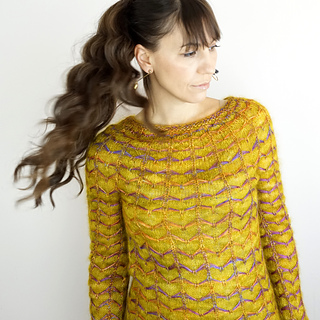patterns >  Stephanie Earp's Ravelry Downloads
Stephanie Earp's Ravelry Downloads
> Clade









Clade
This top-down yoke sweater uses a variation on a smock stitch to create a luxurious and elegant fabric. I’ve used it before in a T-shirt and a cowl called Sweet Vicious. Since this is joining the family, I’ve called it Clade.
The stitch is not hard to do, and is even simpler in this design since it is only worked on the right side (except in your swatch). It does require working with two yarns at once, so experience with stranded knitting is an asset.
The resulting garment is certainly delicate - a lovely choice for a night out or a special occasion, but not ideal for lounging. The long floats can catch on things - to repair them, gently pull the strands back into place from the wrong side.
Choosing a Size: The sample shown here is size 2 modeled here with zero ease. For a similar fit, choose a size no more than 2” larger than your actual bust. However, this simple style would look just as lovely worn oversized. Ease is a styling choice and you can make any size that pleases you.
MATERIALS:
- Yarn A: fingering weight (270/320/350/400) (440/480/530/570) yards Sample shown in Riverside Studios Silk in Sari (100% silk; 50g; 200y)
- Yarn B: mohair lace (620/720/820/925) (1025/1125/1230/1330) yards Sample shown in Swift Yarns Swift Fluff (70% kid mohair, 30% silk; 50g; 420 m/459 y) in Raisin Gold
- US 7 (4.5 mm) circular needles 16”, 24”, 32” and preferred needles for small circumference knitting; US 6 (4 mm) straight or circular needle of any length for I-cord bindoff.
- Darning needle
- Stitch holders or waste yarn
- 1 stitch marker
GAUGE:
-
19 sts/23 rounds over 4”/10 cm square in pattern on larger needles, after blocking.
36 projects
stashed
46 times
22 projects
stashed
17 times
- First published: January 2020
- Page created: January 6, 2020
- Last updated: January 6, 2020 …
- visits in the last 24 hours
- visitors right now





